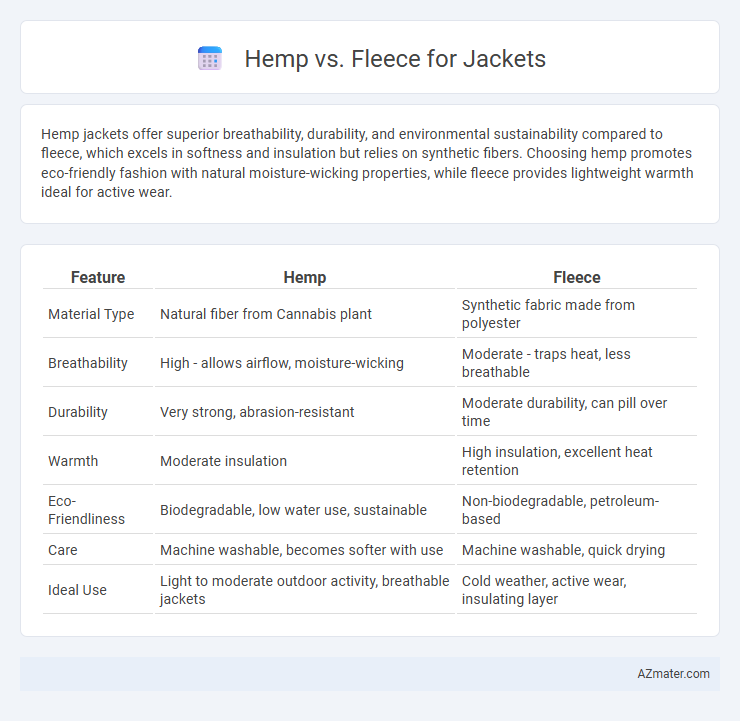Hemp jackets offer superior breathability, durability, and environmental sustainability compared to fleece, which excels in softness and insulation but relies on synthetic fibers. Choosing hemp promotes eco-friendly fashion with natural moisture-wicking properties, while fleece provides lightweight warmth ideal for active wear.
Table of Comparison
| Feature | Hemp | Fleece |
|---|---|---|
| Material Type | Natural fiber from Cannabis plant | Synthetic fabric made from polyester |
| Breathability | High - allows airflow, moisture-wicking | Moderate - traps heat, less breathable |
| Durability | Very strong, abrasion-resistant | Moderate durability, can pill over time |
| Warmth | Moderate insulation | High insulation, excellent heat retention |
| Eco-Friendliness | Biodegradable, low water use, sustainable | Non-biodegradable, petroleum-based |
| Care | Machine washable, becomes softer with use | Machine washable, quick drying |
| Ideal Use | Light to moderate outdoor activity, breathable jackets | Cold weather, active wear, insulating layer |
Introduction: Comparing Hemp and Fleece Jackets
Hemp jackets offer unparalleled durability, breathability, and eco-friendly benefits, making them a sustainable choice for outerwear. Fleece jackets, crafted from synthetic polyester, provide exceptional warmth, lightweight comfort, and moisture-wicking properties ideal for cold-weather activities. Comparing hemp and fleece jackets highlights a trade-off between natural, biodegradable materials and synthetic insulation performance.
Material Origins: Hemp vs Fleece Explained
Hemp is derived from the fibrous stalks of the Cannabis sativa plant, known for its sustainability, durability, and breathability, making it an eco-friendly choice for jackets. Fleece is a synthetic material typically made from polyester, originating from petroleum-based products, offering lightweight warmth and moisture-wicking properties. The natural origins of hemp contrast with the manufactured nature of fleece, influencing environmental impact and performance characteristics in jacket production.
Environmental Impact: Sustainability Factors
Hemp jackets offer superior sustainability due to hemp's rapid growth, low water usage, and natural resistance to pests, reducing the need for harmful pesticides and fertilizers. Fleece jackets, often made from petroleum-based polyester, contribute to microplastic pollution and have a higher carbon footprint due to synthetic fiber production. Choosing hemp over fleece supports eco-friendly fashion by promoting biodegradable, renewable materials with a significantly lower environmental impact.
Warmth and Insulation: Performance in Cold Weather
Hemp jackets provide excellent breathability and natural moisture-wicking properties but often lack the high insulation capacity needed for extreme cold weather. Fleece jackets excel in warmth and insulation due to their dense synthetic fibers, which trap heat effectively and offer superior thermal retention. For cold weather performance, fleece consistently outperforms hemp in maintaining body heat and providing comfortable insulation.
Breathability and Comfort: Daily Wear Experience
Hemp jackets offer superior breathability due to their natural fibers, allowing moisture to escape and keeping skin dry during daily wear. Fleece jackets provide excellent warmth but may trap heat, making them less comfortable for extended use in mild to warm conditions. For everyday comfort, hemp's lightweight and breathable nature enhances all-day wearability in variable temperatures.
Durability and Longevity: Which Lasts Longer?
Hemp jackets offer exceptional durability due to the plant's strong fibers, resisting wear and tear better than fleece over time. Fleece, typically made from synthetic materials like polyester, tends to pill and degrade faster with frequent washing and heavy use. Hemp's natural resistance to abrasion and UV damage ensures jackets made from this fabric maintain their structure and appearance significantly longer than fleece alternatives.
Style and Versatility: Fashion Considerations
Hemp jackets offer a natural, textured appearance that aligns with eco-friendly and bohemian fashion trends, providing unique, rustic style versatility suitable for casual and semi-formal wear. Fleece jackets emphasize comfort and functionality with a soft, plush texture, excelling in casual, sporty, and outdoor fashion contexts due to their warmth and lightweight nature. Style versatility in hemp is often enhanced by its breathability and durability, while fleece excels in layering options and color variety, catering to different wardrobe needs.
Care and Maintenance: Cleaning Requirements
Hemp jackets require gentle washing in cold water with mild detergent to preserve fiber strength and prevent shrinkage, while avoiding bleach and harsh chemicals is crucial to maintain fabric integrity. Fleece jackets are machine washable in warm water, drying quickly without special care, but they benefit from using gentle cycle settings and avoiding fabric softeners that can degrade the material's softness and breathability. Both materials perform best when air-dried to prevent damage and prolong jacket lifespan.
Price Comparison: Affordability Breakdown
Hemp jackets typically range from $80 to $150, offering a durable and sustainable option at a moderate price point, while fleece jackets generally cost between $40 and $120, making them more affordable for budget-conscious buyers. The production costs of hemp fabrics are higher due to eco-friendly processing methods, which influence the price gap compared to fleece made from synthetic fibers like polyester. Consumers prioritizing cost-effectiveness often lean toward fleece, but those seeking long-term value and environmental benefits may find hemp jackets a worthy investment despite the higher price.
Final Verdict: Choosing the Right Jacket Material
Hemp jackets offer superior durability, breathability, and eco-friendliness, making them ideal for sustainable fashion enthusiasts and outdoor use. Fleece jackets provide excellent warmth, softness, and lightweight comfort, perfect for active wear and cold weather layering. Selecting the right jacket material depends on prioritizing environmental impact and breathability with hemp or opting for thermal insulation and softness with fleece.

Infographic: Hemp vs Fleece for Jacket
 azmater.com
azmater.com